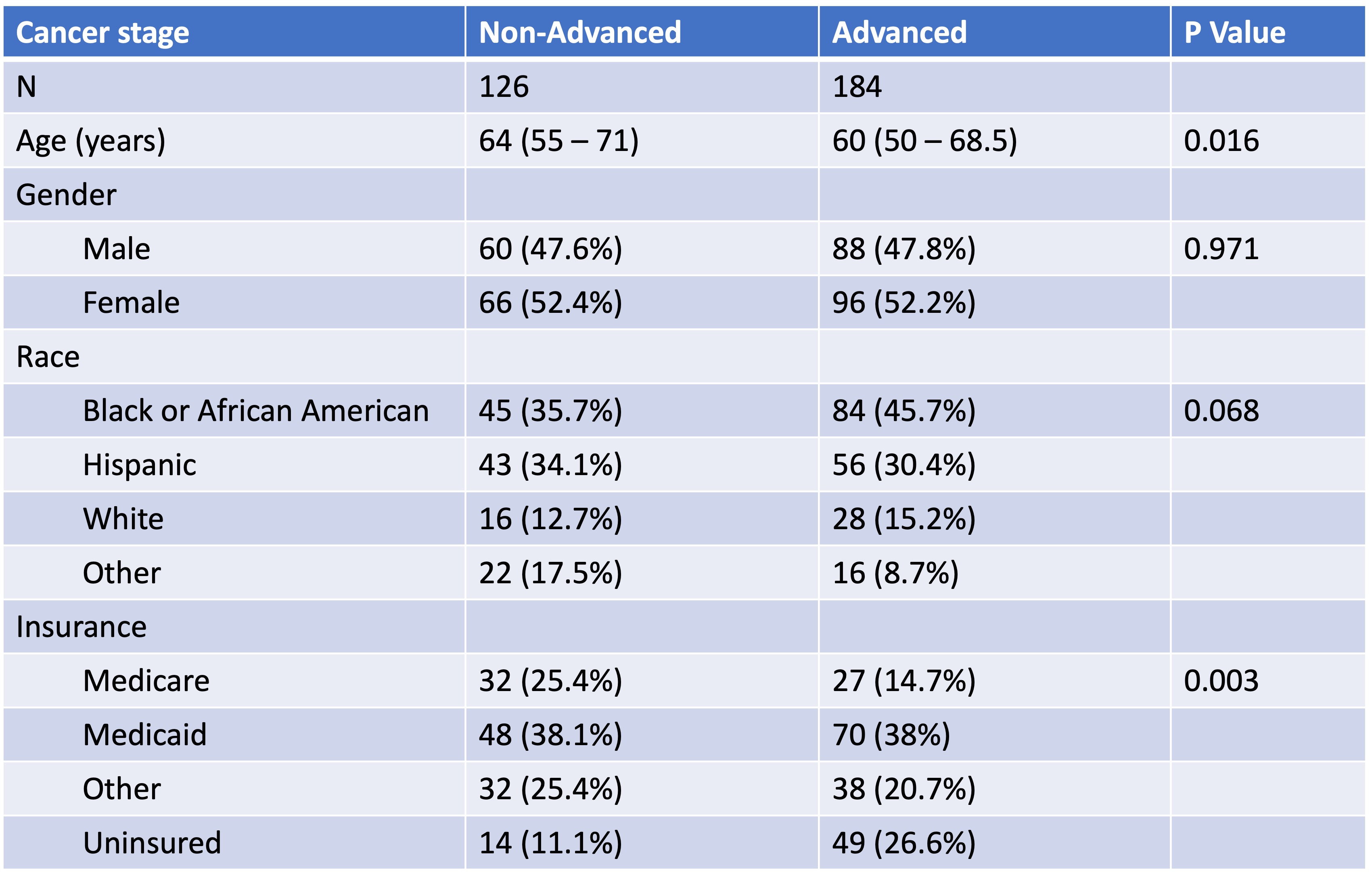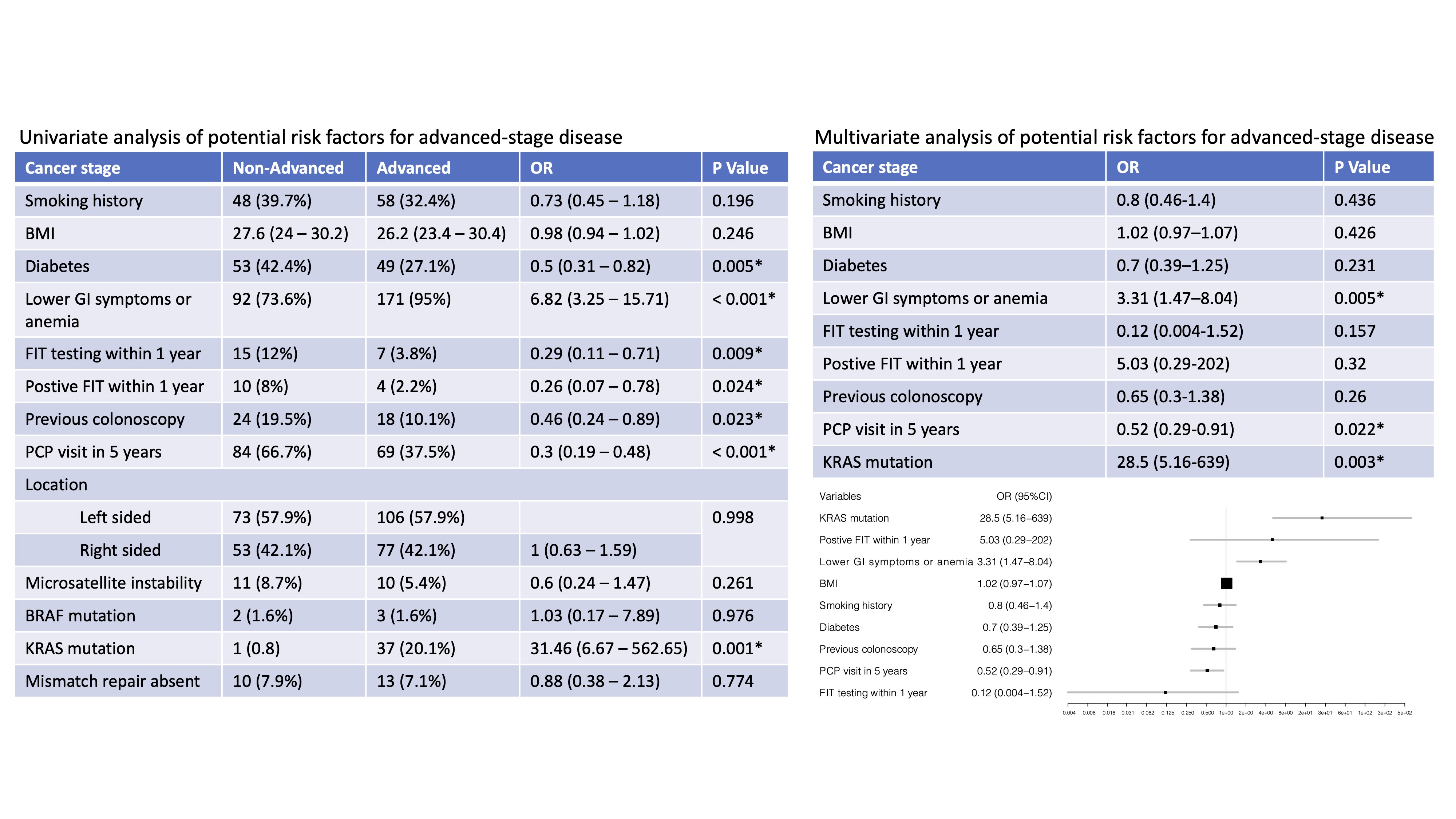Monday Poster Session
Category: Colon
P2457 - Risk Factors for Advanced-Stage Disease at Diagnosis in Colorectal Cancer
- CG
Changlin Gong, MD
NYC Health + Hospitals/Jacobi
Bronx, NY
Presenting Author(s)
1NYC Health + Hospitals/Jacobi, Bronx, NY; 2North Central Bronx Hospital, Bronx, NY; 3NYC Health + Hospitals/Metropolitan, New York, NY; 4Mayo Clinic, Jacksonville, FL, US, Jacksonville, FL
Introduction:
According to American Cancer Society, at the beginning of colorectal cancer (CRC) screening era, an increase in local cancer and decrease in more advanced cancer were observed. However, this trend seems to be reversed in recent years. We conducted this study to identify potential risk factors of advanced-staged disease at the time of CRC diagnosis.
Methods:
We retrospectively examined patients who were diagnosed with CRC in our institution and had a visit between July 2019 and March 2025. All patients with stage 0, I, and II CRC were included in non-advanced group, and patients with stage III and IV cancer were included in advanced group. Electronic medical record was reviewed and information on potential risk factors such as smoking status, lower gastrointestinal (GI) symptoms or anemia, FIT test results, and cancer genetics were collected. Univariate and multivariate logistic regression was performed to identify risk factors.
Results:
We identified 126 patients with non-advanced CRC and 184 patients with advanced CRC. Patients with advanced CRC were younger at diagnosis (60 vs 64 years old, P = 0.016) and more likely to be uninsured (26.6% vs 11.1%, P = 0.003). Significant risk factors found by univariate analysis include lower GI symptoms or anemia and KRAS mutation. In contrast, people who had diabetes, FIT with in 1 year prior, positive FIT results within 1 year prior, and primary care physician (PCP) visit within 5 years prior are less likely to have advanced CRC. All potential risk factors or protective factors with a P value of < 0.25 were included in multivariate analysis, which identified lower GI symptoms or anemia and KRAS mutation as significant risk factors for advanced-stage disease with odd ratio (OR) of 3.31 (95% CI, 1.47-8.04) and 28.5 (95% CI, 5.16-639), respectively. PCP visit within 5 years prior is a significant protective factor against advanced stage disease with an OR of 0.52 (95% CI, 0.29-0.91).
Discussion:
Lower GI symptoms or anemia, KRAS mutation, and absence of primary care engagement are significant risk factors for advanced-stage disease at the time of CRC diagnosis. Other potential protective factors such as diabetes and prior screening also indicated better engagement in healthcare. Contrary to common beliefs, lifestyle modification such as smoking cessation and weight loss does not prevent advanced CRC. Actively enrolling patient in primary care clinic and detecting CRC before symptoms or anemia develops by screening tests can help with early diagnosis.
Figure: Demographic characteristics of patients with colorectal cancer
Figure: Univariate and multivariate analysis of potential risk factors for advanced-stage disease
Disclosures:
Changlin Gong indicated no relevant financial relationships.
Dharshana Prem Anand indicated no relevant financial relationships.
Maria Felix Torres Nolasco indicated no relevant financial relationships.
Michail Kladas indicated no relevant financial relationships.
Maria Gabriela Rubianes Guerrero indicated no relevant financial relationships.
Osayande Osagiede indicated no relevant financial relationships.
Donald Kotler indicated no relevant financial relationships.
Changlin Gong, MD1, Dharshana Prem Anand, MD1, Maria Felix Torres Nolasco, MD1, Michail Kladas, MD2, Maria Gabriela Rubianes Guerrero, MD3, Osayande Osagiede, MBBS, MPH4, Donald P. Kotler, MD1. P2457 - Risk Factors for Advanced-Stage Disease at Diagnosis in Colorectal Cancer, ACG 2025 Annual Scientific Meeting Abstracts. Phoenix, AZ: American College of Gastroenterology.

